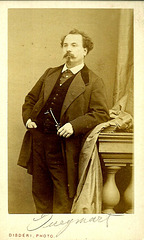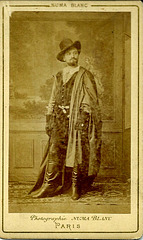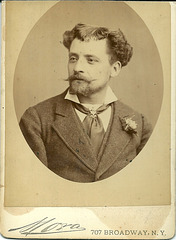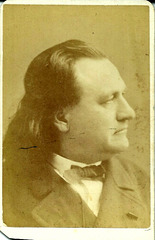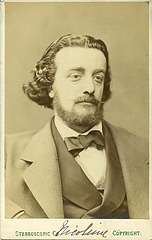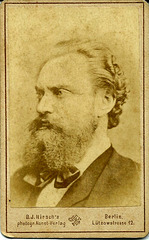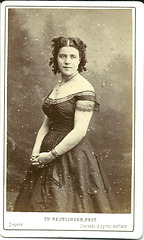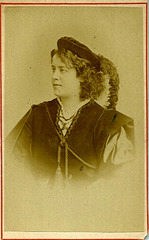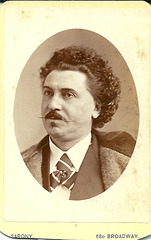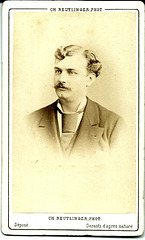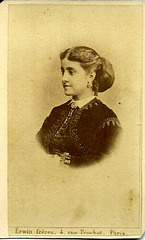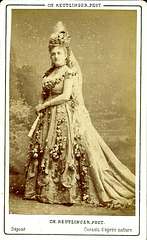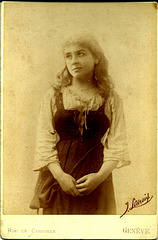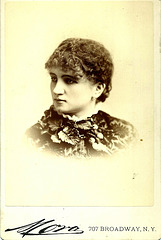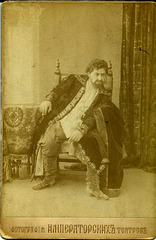OperaMania's photos
Louis Gueymard by Disderi
| |
|
LOUIS GUEYMARD
(17 August 1822 - July 1880)
French Tenor
Born in Chaponnay .He then received voice training at the Opéra National de Lyon. He made his opera debut there in 1845 and then pursued further voice studies at the Conservatoire de Paris from 1846-1848.
In 1848 Guéymard became a leading tenor at the Paris Opera where he sang until 1868. He created roles in several world premieres with that company, including Philippe d'Autriche in Louis Clapisson's Jeanne la folle (1848), Jonas in Giacomo Meyerbeer's Le prophète (1849), Phaon in Charles Gounod's Sapho (1851), Rodolphe in Armand Limnander's Le maître chanteur (1853), Rodolphe in Gounod's La nonne sanglante (1854), Henri in Giuseppe Verdi's Les vêpres siciliennes (1855), Fromental Halévy's La magicienne (1858), Julien de Médicis in Józef Michał Poniatowski's Pierre de Médicis (1860), Adoniram in Gounod's La reine de Saba (1862), and Roland in Auguste Mermet's Roland à Roncevaux (1864).
On the international stage Guéymard was a guest artist at the Royal Opera House in London in 1854. He also appeared at the French Opera in New Orleans in the 1873-1874 season. Other roles in Guéymard's repertoire included Arnold in William Tell, Jean de Leyde in Le prophète, both Manrico and Ruiz in Il trovatore, Rodolfo in Luisa Miller, Tebaldo in I Capuleti e i Montecchi, and the title role in Robert le diable.
Guéymard married Belgian opera singer Pauline Guéymard-Lauters in 1858, but the marriage ended in divorce in 1868. He died in Corbeil-Essonnes at the age of 57.
Louis Gueymard by Chevalier
| |
|
LOUIS GUEYMARD
(17 August 1822 - July 1880)
French Tenor
Born in Chaponnay .He then received voice training at the Opéra National de Lyon. He made his opera debut there in 1845 and then pursued further voice studies at the Conservatoire de Paris from 1846-1848.
In 1848 Guéymard became a leading tenor at the Paris Opera where he sang until 1868. He created roles in several world premieres with that company, including Philippe d'Autriche in Louis Clapisson's Jeanne la folle (1848), Jonas in Giacomo Meyerbeer's Le prophète (1849), Phaon in Charles Gounod's Sapho (1851), Rodolphe in Armand Limnander's Le maître chanteur (1853), Rodolphe in Gounod's La nonne sanglante (1854), Henri in Giuseppe Verdi's Les vêpres siciliennes (1855), Fromental Halévy's La magicienne (1858), Julien de Médicis in Józef Michał Poniatowski's Pierre de Médicis (1860), Adoniram in Gounod's La reine de Saba (1862), and Roland in Auguste Mermet's Roland à Roncevaux (1864).
On the international stage Guéymard was a guest artist at the Royal Opera House in London in 1854. He also appeared at the French Opera in New Orleans in the 1873-1874 season. Other roles in Guéymard's repertoire included Arnold in William Tell, Jean de Leyde in Le prophète, both Manrico and Ruiz in Il trovatore, Rodolfo in Luisa Miller, Tebaldo in I Capuleti e i Montecchi, and the title role in Robert le diable.
Guéymard married Belgian opera singer Pauline Guéymard-Lauters in 1858, but the marriage ended in divorce in 1868. He died in Corbeil-Essonnes at the age of 57.
Theodore Stephanne by Numa Blanc
| |
|
Theodore Stephanne
1851-????
French Tenor
Debut 1875 Opera Comique as Loredan in "Haydee" by Auber. Created at Opera Comique 1877 Thou in "Cinq-Mars" by Gounod although role written for a baritone , Sang Don Jose in "Carmen by Bizet
Theodore Stephanne by Numa Blanc
| |
|
Theodore Stephanne
1851-????
French Tenor
Debut 1875 Opera Comique as Loredan in "Haydee" by Auber. Created at Opera Comique 1877 Thou in "Cinq-Mars" by Gounod although role written for a baritone , Sang Don Jose in "Carmen by Bizet
Victor Capoul by Mora
| |
|
VICTOR CAPOUL
(27 February 1839 – 18 February 1924)
French Tenor
He began his studies in 1859 at the Conservatoire of Paris . He debuted in 1861 at the Opéra-Comique Paris as Daniel in 'Le chalet' of Adam. By 1870, he remained at the Opéra-Comique as principal tenor until the outbreak of the Franco-Prussian war in 1870 .during which he sought asylum in England , There he joined the Mapelson Company at Drury Lane , making his debut as Faust in Gounod's "'Faust " then 1871-75 at the Italian Opera London At London he appeared at Covent Garden for the first time in 1877 , as Fra Diavolo . Lionel 'Marta" , Faust , Elvino ,and Ernesto.With Mapelson he went to the USA where he was regular visitor until 1884 , again at the New York Metropolitan Opera 1891-1892 ; He made his debut there as Gounod's Faust and sang seven roles: the Edgardo in "Lucia di Lammermoor ', in Wilhelm Meister' Mignon 'of A.Thomas, Count Almaviva in" The Barber of Sevbilla', the Alfredo in "La Traviata 'Tybalt in' Romeo et Juliette 'by Gounod, the Enzo in "La Gioconda" by Ponchielli and worked among others in 1891 in the Metropolitan premiere of Verdi's' Othello' as Cassio with. In the years 1892-97 he lived as a singing teacher in New York; then he became a director of the Grand Opera of Paris. In 1905 he gave up this activity.
Alois Ander by Mahlknecht
| |
|
|
ALOIS ANDER
( Aloys Anderle )
(b. August 10 1821 in Libitz at the Doubrawa , Bohemia , d. 11 December 1864 in Wartenberg )
Austrian Tenor
Alois Ander in 1845 through the mediation of the singer Franz Wild at the Vienna Court Opera he was engaged,in the role of Alessandro Stradella in ( Flotow's opera of the same), He has since been a favorite with audiences in Vienna and remained faithful despite alluring engagement requests that were sent to him as a result of his concert tours. One of his last major roles was the Franz Grove in the world premiere of Jacques Offenbach's The Rheinnixen on 4 February 1864, Richard Wagner's hope that his first Tristan were taken from Offenbach's work.
He died in the bathroom at Wartenberg due to a mental disorder.
His singing was characterized by less heroic force and sharp pattern of expression than poetry, intimacy and artistic seriousness from which his dramatic designs lent a peculiar charm.
Karl Formes by Unknown
| |
|
KARL FORMES
(Karl Johann Franz Formes)
(b. Mülheim am Rhein, 7 August 1815; d. San Francisco, 15 December 1889)
German Bass
debut in 1842 at the Cologne Opera as Sarastro in Die Zauberflöte. Until 1844 he remained in Cologne, 1844-45 was engaged at the Mannheim court theater and went from there in breach of his contract in 1845 at the Vienna Court Opera (in theaters on Kärntnertor). On 11.25.1847 he sang at the Theater am Kärntnertor in Vienna the Plumkett in the world premiere of the opera 'Martha' by Friedrich von Flotow. active 1848-49 at the Deutsche Oper in Amsterdam. In 1849 he guested at the Drury Lane Theatre London as Sarastro, 1850 at the Covent Garden Opera as Kaspar in the 'Freischütz'. Until 1862 he was often to be found at the Covent Garden Opera, where he in the world premiere of a new version of the Opera 'Faust' by Louis Spohr and 1855 in the British premiere of Meyerbeer's 'Étoile du Nord' also took part in 1852. In 1852 he undertook guest performances in Italy and Spain. In 1853 he sang as guest at the Berlin Court Opera, the Marcel in the 'Huguenots', Kaspar in the 'Freischütz' and Sarastro in Die Zauberflöte. In 1854 he gave guest performances in Cologne, Wiesbaden and Hamburg, in the following years in Coburg, Weimar, Danzig, Königsberg (East Prussia) and Magdeburg, 1861 in Rostock and Schwerin, 1867 in Leipzig. In 1857 he came to Nodamerika where he 1864-67 guest performances and concerts in New York and in other American cities had over the years and occurred at the Opera of Havana for the first time.
Ernesto Niccolini by Stereoscopic Co
| |
|
ERNESTO NICCOLINI
(Ernest Nicolas )
(February 23, 1834 - January 19, 1898)
French Tenor
Born in Saint Malo, France, he studied at the Paris Conservatory and made his debut in 1857, at the Opéra-Comique in Halevy's Les mousquetaires de la reine. After further study in Italy, he made his debut at La Scala in Milan in 1859, under the name Ernesto Nicolini, as Alfredo in La traviata, other roles there included Rodrigo in Rossini's Otello, and Elvino in Bellini's La sonnambula.
On his return to France he sang at the Théâtre-Italien from 1862 until 1869. He made his debut at the Royal Opera House, Covent Garden, in London in 1866, as Edgardo in Lucia di Lammermoor, without great success due to the pronounced vibrato that marred his singing.
Five years later he returned to London to sing in Faust and Robert le diable at Drury Lane, and from 1872 appeared every season at the Royal Opera House until 1884; his roles there included Pery in Il Guarany, Radames in Aida, and the title role in Lohengrin. He created the role of Celio at the premiere of Charles Lenepveu's Velléda in 1882.
During the season 1874-75, he appeared in St Petersburg and Moscow, opposite the world-famous soprano Adelina Patti, whom he would partner in almost all her appearances thereafter, accompanying her on concert tours of the major western European capitals (Vienna, Milan, Venice, Brussels, Berlin and so on), as well on tours of the United States and South America.
While together in Paris in 1886, singing in Faust at the Grand Opéra, the two created something of a scandal by getting married; Patti had divorced her first husband, the Marquis de Caux, shortly before her wedding to Nicolini.
Nicolini appeared on stage for the last time at Drury Lane in 1897, as Almaviva in Il barbiere di Siviglia. He died the following year in Pau, France.
Albert Niemann by B J Hirsch's
| |
|
ALBERT NIEMANN
(15 January 1831 – 13 January 1917)
German Tenor
Niemann made a debut in Dessau in 1849, singing in minor roles and in chorus. He received training from Fritz Schneider (director of the ducal Hofkapell), from Albert Nusch and from Gilbert Duprez in Paris. Until 1866 he had various engagements in Stuttgart, Königsberg, Stettin, and from 1854 in Hannover. At Hannover he sang Tannhäuser (from 1854), Lohengrin (from 1855) and Rienzi (from 1859).In 1864, Niemann sang as guest in two performances of Tannhäuser at Munich, and in one of Lohengrin by the arrangement of Ludwig II, shortly before the death of King Maximilian II of Bavaria. Ludwig invited Niemann to repeat these roles in Munich in 1866, but war intervened: in the following year he was again invited, but declined, because the usual cuts were not to be made. In 1866, he became a member of the Berlin Opera, and remained so until 1888. In April 1870, he sang Walther in the Berlin Meistersinger premiere. As Tichatschek had grown old, and after Ludwig Schnorr's death in 1865, Niemann had become one of the most experienced and advanced Wagnerian tenors,
In May 1872 he was in the quartet of soloists (with Johanna Jachmann-Wagner, Marie Lehmann and Franz Betz) in the inaugural performance of Beethoven's Ninth Symphony at the foundation-stone laying of the Bayreuth Festspielhaus,
Niemann remained with the Berlin opera until 1888, but in the later years of his career he participated in several important tours. In 1882, he appeared as Siegmund in the first London Die Walküre, at Her Majesty's Theatre. In 1883, he was one of the twelve pall-bearers at Wagner's funeral at Wahnfried. From 1886 to 1888 he appeared at the Metropolitan Opera House, as the first American Tristan (December 1, 1886, Anton Seidl, conductor, Lilli Lehmann, Isolde, as Siegfried in the first American Götterdämmerung ( January 25, 1888, with Lilli Lehmann as Brünnhilde, and in Spontini's opera Fernando Cortez. In New York, he also sang Siegmund, John of Leyden in Le prophète, Tannhäuser, Lohengrin, Florestan (in Fidelio), and Eleazar in La juive. Angelo Neumann's touring company, in which Niemann took part under Seidl's conductorship, toured with the Ring through many towns of Germany, Belgium, Holland, Switzerland, Italy, Hungary, and AustriaAlbert Niemann died in Berlin, two days short of his 86th birthday.
Rosine Bloch by Reutlinger
| |
|
ROSINE BLOCH (7 November 1844 – 1 February 1891) was a French operatic mezzo-soprano
Most of her career was spent performing at the Opéra in Paris, she also appeared in stages in Belgium, Monaco, and England.
She studied at the Paris Conservatoire with Nicolas Levasseur and Charles-Amable Battaille and in 1865 won the Conservatoire's first prize for singing and the first prize for opera.]
She made her professional opera debut on 13 November 1865 at the Opéra's Salle Le Peletier as Azucena in Giuseppe Verdi's Le trouvère and continued singing in that theatre, where her most notable roles included Lelia in Félicien David's Herculanum and Léonore in Gaetano Donizetti's La favorite. She also sang Edwige in Gioacchino Rossini's Guillaume Tell (with Jean-Baptiste Faure as Guillaume and Marie Battu as Mathilde in 1868 and with Caroline Carvalho as Mathilde in 1870), and Fidès in Giacomo Meyerbeer's Le prophète in 1872. Although Bloch was striking in appearance with an ample, rich-timbred voice, it had become apparent over time that her portrayals lacked the "human quality" necessary for her to become a major star. Nevertheless, in the ensuing years she remained an honorable and respected member of the company.
She also created two roles, Lysis in the world premiere of Jules-Laurent Duprato's 1-act La Fiancée de Corinthe, which had a libretto by Camille du Locle and was first performed on 21 October 1867, but was an opera that would soon fall into obscurity after only 14 representations, and Claribel in Eugène Diaz's 3-act La Coupe du Roi de Thulé, which had a libretto by L. Gallet and Edouard Blau and premiered on 10 January 1873, but would only be performed 21 times. The latter had won a competition which had been held by the Ministry of Fine Arts in 1869.
Rosine Bloch by Reutlinger
| |
|
ROSINE BLOCH (7 November 1844 – 1 February 1891) was a French operatic mezzo-soprano
Most of her career was spent performing at the Opéra in Paris, she also appeared in stages in Belgium, Monaco, and England.
She studied at the Paris Conservatoire with Nicolas Levasseur and Charles-Amable Battaille and in 1865 won the Conservatoire's first prize for singing and the first prize for opera.]
She made her professional opera debut on 13 November 1865 at the Opéra's Salle Le Peletier as Azucena in Giuseppe Verdi's Le trouvère and continued singing in that theatre, where her most notable roles included Lelia in Félicien David's Herculanum and Léonore in Gaetano Donizetti's La favorite. She also sang Edwige in Gioacchino Rossini's Guillaume Tell (with Jean-Baptiste Faure as Guillaume and Marie Battu as Mathilde in 1868 and with Caroline Carvalho as Mathilde in 1870), and Fidès in Giacomo Meyerbeer's Le prophète in 1872. Although Bloch was striking in appearance with an ample, rich-timbred voice, it had become apparent over time that her portrayals lacked the "human quality" necessary for her to become a major star. Nevertheless, in the ensuing years she remained an honorable and respected member of the company.
She also created two roles, Lysis in the world premiere of Jules-Laurent Duprato's 1-act La Fiancée de Corinthe, which had a libretto by Camille du Locle and was first performed on 21 October 1867, but was an opera that would soon fall into obscurity after only 14 representations, and Claribel in Eugène Diaz's 3-act La Coupe du Roi de Thulé, which had a libretto by L. Gallet and Edouard Blau and premiered on 10 January 1873, but would only be performed 21 times. The latter had won a competition which had been held by the Ministry of Fine Arts in 1869.
Theodor Wachtel by Sarony
| |
|
THEDORE WACHTEL
1823-1893
German Tenor
He studied in Hamburg at Mme Julie Grandjean and Eckhardt in Vienna. He debuted in 1847 in Hamburg in a concert he gave in the salon of his patron. He began his career in 1849 at the Court Theatre actual stage of Schwerin (debut as Arturo in "Lucia di Lammermoor"), where he served until 1851. He came neither here nor in a subsequent engagement at the Court Opera of Dresden for special achievements. 1852-54 he worked at the Municipal Theatre of Würzburg, 1854-56 and 1856-57 at the Court Theatre of Darmstadt at the Court Theatre of Hanover. In 1857 he went to the Court Theatre of Kassel. Here he was exposed to all sorts of harassment, so that he left Kassel fled in violation of the existing contract. Because of this contract break he could sign a contract but occur only in guest appearances in the following years with no German theater more. This earned him now but in Dresden, Vienna and Berlin a brilliant success. He toured England, Ireland and Sweden. 1863-68 he had great success, where he made his debut as Edgardo in "Lucia di Lammermoor" at the Berlin Court Opera. A particular high point of his career with appearances in London, where he was at the Covent Garden Opera and in 1879 at Her Majesty's Theatre to host in 1862, 1864-65 and 1870. At the Covent Garden Opera, he sang in 1865 in the British premiere of Meyerbeer's "Africaine" Vasco with Pauline Lucca in the role of Selika; He had great success in London and in the opera "Alessandro Stradella" by Flotow. In 1869, he appeared as a guest in Paris, where he attracted no particular attention. In the years 1871-72 and 1875-76, he participated in the North American tours, where he sang opera in German as in Italian. General admiration excited his voice especially because of their powerful sonority in the high and highest altitudes. The high C and even higher notes were produced by him effortlessly and with chest voice. Such was his starring role in the Chapelou "Le Postilion de Lonjumeau" of Adam with her unusual demands on the pitch of the tenor voice. About 1000 times he has been in Germany in this his signature role on the stage, so that they sometimes quite identified it with this game. In this case, it still came his special ability in good stead in the crack of a whip, which stemmed from the fact that he had worked in his youth as a coachman, and later as Managing Director in the trucking company of his father. Other major roles of the artist were the Manrico in "Il Trovatore" by Verdi, the title character in Flotow's "Stradella Alessandro", the Raoul in the 'Huguenots' by Meyerbeer and Arnoldo in Rossini's "William Tell". In 1876, he tried to contact the Lohengrin a Wagner role in his repertoire, but had no success. He was made an honorary member of the Court Theatre of Schwerin and Coburg. On 03/08/1893 the great tenor in Berlin gave his last Konzert.Er died in the same year. -. Among his sons had the highly talented but died young Theodor Wachtel Jr. (? * 1841, Dessau 12/12/1871) at theaters in Leipzig, Dusseldorf, Vienna and Dessau a successful career, but this had to end prematurely. August quail was engaged since 1889 as a tenor at the court theater of Dessau; Ferdinand Wachtel was a buffo character and tenor known (David in "Die Meistersinger," Mime in the Ring of the Nibelung) and was engaged in the theaters of Poznan, Brno, Zurich (1892-94), Aachen, Neustrelitz and last until 1900 in Rostock; he then lived as a concert singer and teacher in Hamburg.
Frederic Archard by Reutlinger
| |
|
FREDERIC ARCHARD
(33.Bordeaux, 07 January 1833-61.Bagnoles - de-l'Orne, 1913)
actor
Created the role of Brissac in the Musketeers at the convent of Varney at the Bouffes-Parisiens on March 16, 1880]
Adelina Patti by Erwin (6)
| |
|
|
ADELINA PATTI
(19 February 1843 – 27 September 1919)
Soprano
Her voice was noticed very early and she nade her first tour in America at the age of seven years and was a huge success. Studied singing in New York under the direction of Maurice Strakosch, her brother-in-law, and in 1859 she sang in New York in Lucia di Lammermoor. At Covent Garden theatre in London in 1861 where she sang la Sonnambula, her reputation was strengthened and in 1862 she was singing in Paris at the Théâtre Italien, where she soon became the star. She remained at Paris until 1870, being heard in London during the summer season. In Paris she sang the Italian Repertory, in London the french Repertory. After a long stay in America and London, Patti returned several times to Paris at the Opera (debut in 1874) and the Théâtre de la Gaîté. Then she resumed travels and successfully created, in London, in 1882, the Charles Lenepveu's Velléda. She also created Dolores of André Pollonais in Nice on February 22, 1897. She triumphed especially in a vast Italian repertoire that suited to her beautiful light soprano voice. His career lasted for fifty-six years.
Marguerite Priola by Reutlinger
| |
|
MARGUERITE PRIOLA
(Marguerite Marie Sophie Polliart)
(Paris, 02/10/1849-13.Marseille, 27/10/1876)
French Soprano
Daughter of Jules - César Patrick, general manager of the theatre of the Folies-Dramatiques
Debut as The Messanger of Peace "Reinzi" Wagner April 06, 1869 at the Théâtre-Lyrique. Debuted at the Opéra-Comique in 1869 in Rêve d'amour. . She created on 30 November 1872 Don César of Bazán (Maritana) by Jules Massenet. Giving a representation of Mignon in 1876 in Marseille, Her voice apparently broke and she was hissed from the stage. The impression of the hostile event she took to heart and caused her to go become physically and mentally ill, she died a few days later, at the age of 26.
Celestina Galli-Marie by Geneve
| |
|
Celestina Galli-Marie as Mignon Creator
CELESTINE GALLI-MARIE
(Marie-Célestine Laurence Marié de l'Isle)
(November 1840 – 22 September 1905)
French mezzo-soprano
Most famous for creating the title role in the opera Carmen.Born in Paris. She was taught singing by her father, Mécène Marié de l'Isle, Her début came in 1859 in Strasbourg, and she sang in Italian in Lisbon.
She sang at the Opéra-Comique until 1885, premiering in Pergolesi's La serva padrona. Her most famous roles were in Thomas's Mignon (1866) and Bizet's Carmen (1875).
She created the roles of Lazarille in Don César de Bazan, Vendredi in Robinson Crusoé, the title part in Fantasio, as well as roles in Lara, Le Capitaine Henriot, Fior d'Aliza, La Petite Fadette, and Piccolino. She also sang Taven in Mireille and Rose Friquet in Les dragons de Villars. She died in Vence, near Nice.
Her voice was described as being of a good timbre, with clear diction and phrasing
Paolina Rossini by Mora
| |
|
PAOLINA ROSSINI
1851-????
Italian Soprano
Made her American debut in 1882 when Mapelson introduced her as Aida "aida" Verdi at the Academy of Music New York
Dimitri Andreevich Usatov by Photography of Imperi…
| |
|
Dimitri Andreevich Usatov
February 22, 1847 - August 23, 1913
Russian tenor .
He studied music with Camille Everardi at the Saint Petersburg Conservatory , He began his career in Kiev and continued in Kazan. There he received the offer of an audition from Edward Napravink , Music Director of the Marinsky Theatre in St Petersburg .His actual debut on the Imperial Stage , however took place at the Bolshoi Theatre in Moscow in 1880 where he remained until 1889. During this period he sang Faust in "Faust" , Duke of Mantua in "Rigoletto" ,Raoul in "les Huguenots" ,Lionel in "Martha" There he creted the role of Lensky in "Eugene Onegin" in 1881 and the role of Andrei in" Mazeppa" in 1884 Vakula "Cherevichki" in 1887.After retiring from stage he taught singing in Tbilisi, ( his most famous pupil was Feodor Chaliapin),Usatov moved to Yalta in 1902
Usatov had a good relationship with the composer Pyotr Ilyich Tchaikovsky. In addition to the operas already mentioned, he performed songs by Tchaikovsky for the Russian Music Society in 1877, 1880 and 1882. At Usatov's request, Tchaikovsky orchestrated one of the songs from his Opus 54, "16 Children's Songs." In 1884, Tchaikovsky dedicated a song from his Opus 57, "Six Songs," to Usatov.

